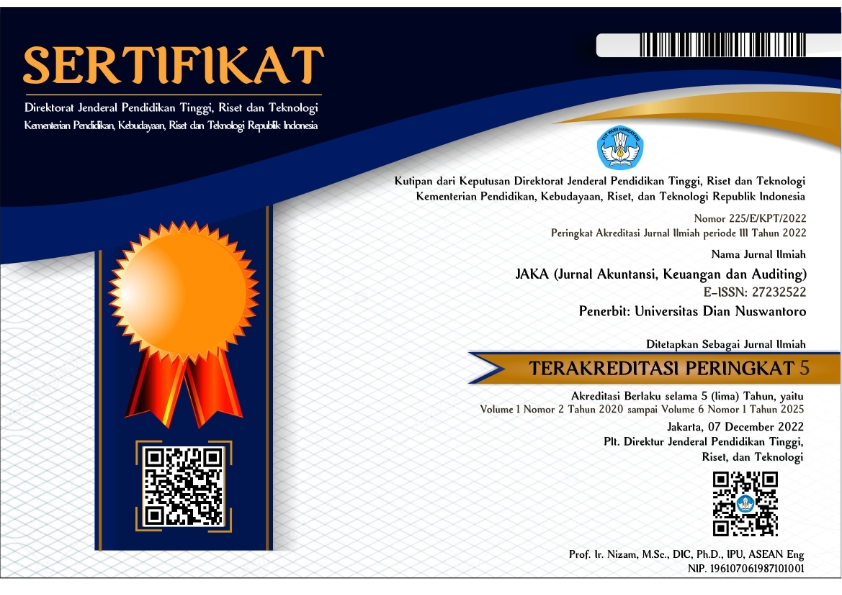Penerapan Peningkatan Fungsi Lembaga Pengawas Menurut Pemikiran Imam Al Ghazali
DOI:
https://doi.org/10.56696/jaka.v3i2.8846Abstract
In this study, the existence of a supervisory system for financial institutions has increased, where initially it was only supervised by a certain line of people, now it has increased, namely with the existence of institutions such as DPS (Sharia Supervisory Board, DSN (National Sharia Council) and so on. Then with the implementation According to Imam Al-Ghazali, the increase in the supervisory function is in accordance with his thoughts regarding hisbah (supervision) or not. The purpose of this research is to explain the concept of how to increase the function of supervisory institutions according to Imam Al-Ghazali. In the context of increasing the function of supervisory institutions, this will increase public trust in Islamic financial institutions, especially in line with the thoughts of the figure of Imam Al-Ghozali. On the other hand, if the implementation of an increase in the supervisory function is in line with Al Ghazali's thinking, then the operating system of the supervisory institution will work in accordance with Islamic principles. The method used in this research is qualitative research, which seeks to explore, understand, and seek social phenomena. The research used in this research is qualitative research. Data collection techniques used in this study are through observation (observation), interviews (interviews), and documentation. According to Miles & Huberman, the data analysis technique used consists of three streams of activities that occur simultaneously, namely: data reduction, data presentation, drawing conclusions or verification. The application of increasing the function of supervisory institutions according to Imam Al-Ghazali is by establishing the pillars of hisbah (supervision), including: Muhtasib (hisbah officer), Muhtasab Fih (deeds that are objects of hisbah), Muhtasab'Alaih (perpetrators addressed to hisbah) and Ihtisab (forms of hisbah). The increase in supervisory institutions is in line with the thoughts of the Islamic figure Al Ghazali, which is seen from the DPS (Sharia Supervisory Board) working system which works to ensure Sharia conformity, the DPS supervises, both actively and passively, especially in the implementation DSN fatwa and provide direction/supervision of products/services and business activities so that they comply with Sharia principles.References
Abdillah, Alfian Mushafiy. (2015). Perbandingan Antara Fungsi Hisbah Dan Lembaga Pengawasan Perekonomian Modern. Skripsi Uin Syarif Hidayatulloh Jakarta.
Al-Ghazali, Imam. (2016). Kimia Kebahagiaan Imam Al-Ghazali. Shahih.
Andini. (2023). Wawancara Dengan Efrida, Selaku Customer Service Bank Syariah.
Anggito Albi Dan Johan Setiawan. (2018). Metodologi Penelitian Kualitatif. Cv Jejak.
Antonio, Syafi’i Muhammad. (2001). Bank Syariah Dari Teori Ke Praktik. Gema Insani.
Efrida. (2023). Wawancara Dengan Efrida, Selaku Customer Service Bank Syariah
Halim, Mara. (2011). Eksistensi Wilayatyl Hisbah. Jurnal Ilmiah, 10(2).
Lintang, Boy Sanjaya. (2023). Wawancara Dengan Boy Sanjaya Lintang, Selaku Customer Service Bank Sumut.
Miles Dan Huberman,. (1992). Analisis Data Kualitatif. Universitas Indonesia Press.
Moloeng, Lexy J.. (2002). Metodologi Penelitian Kualitatif. Pt Remaja Rosda Karya.
Ni’ Matuzahroh Dan Susanti Prasetyaningrum. (2018). Observasi: Teori Dan Aplikasi Psikologi. Umm Press.
Nofinawati. (2016). Perkembangan Perbankan Syariah Indonesia. Journal Of Sharian Banking, 14(2).
Nurhasanah, Neneng. (2013). Pengawasan Islam Dalam Operasional Lembaga Keuangan Syariah”, Mimbar. Vol. 29(1).
Prastyaningsih, Ika Dan Syamsuri. (2018). Relevansi Pengawasan Islam (Hisbah) Terhadap Peran Dewan Pengawas Syariah Dalam Implementasi Syariah Complaince Perbankan Syariah. Vol. 3(1).
Rahmawati, Lilik. (2012). Konsep Ekonomi Al- Ghazali. Maliyah, Vol. 2.
Sari, Eva Indah, Abdul Naser Dan Ali Hardana, R. A. (2021). Determinan Of Customer Loyalty. Journal Of Sharia Banking, 2(1).
Sibua, Hotma P. Dan Asmak Ul Hosnah. (2022). Sendi Sendi Hukum Konstitusional. Pt Raja Grafindo Persada.
Simbolon, Maringan Masry. (2004). Dasar – Dasar Administrasi Dan Manajemen. Ghalia Indonesia.
Sjahdeiny, Sultan Reny. (2014). Perbankan Syariah :Produk-Produk Dan Aspek-Aspek Hukumnya. Kencana.
Sugiono. (2014). Memahami Penelitian Kualitatif,. Alfabeta.
_______. (2017). Metode Penelitian Bisnis. Alfabeta.
Suherli, Ian Rakhmawan, Dedah Jubaedah Dan Pandu Pribadi. (2022). Pemikiran Imam Al Mawardi Tentang Lembaga Pengawas Kegiatan Ekonomi Guna Meningkatkan Perekonomian Negara. Jurnal Ekonomi Syariah Dan Binsin, Vol. 5(1).
Umam, Khotibul Dan Setiawan Budi Utomo. (2016). Perbankan Syariah. Pt. Raja Grafindo Persada.
Yahya, Yohannes. (2006). Pengantar Manajemen (Yogyakarta: Graha Ilmu, 2006). Graha Ilmu.
Downloads
Published
How to Cite
Issue
Section
License
Copyright (c) 2023 JAKA (Jurnal Akuntansi, Keuangan, dan Auditing)

This work is licensed under a Creative Commons Attribution-ShareAlike 4.0 International License.












